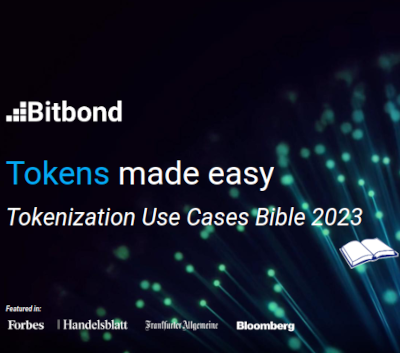Introduction
Welcome to the future of finance, where traditional assets are being reimagined and redefined through the revolutionary concept of tokenization. In the Bitbond’s report “Tokens made easy
July 2023″ we will delve into the transformative power of tokenization, exploring its impact on financial assets, real-world assets, natively digital assets, and certifications. From the tokenization of financial assets to the creation of digital twins and the issuance of natively digital assets, this guide will provide a deep understanding of the key elements of tokenization and its potential to reshape the digital economy.

Tokenization of Financial Assets
The tokenization of financial assets represents a paradigm shift in the way traditional assets are managed, traded, and accessed. By leveraging blockchain technology, financial assets such as securities, bonds, and currencies can be digitized and represented as tokens on a decentralized network.
This not only enables instant settlement and reduced counterparty risk but also enhances transparency and accessibility for a global investor base. The benefits for issuers, investors, and arrangers are substantial, including cost-effective cross-border transactions, increased liquidity, and regulatory compliance with transparent digital asset solutions.
Digital Twins of Physical Assets
The concept of digital twins brings the physical world into the digital realm, allowing real-world assets such as real estate, art, and commodities to be tokenized and traded on blockchain networks. This not only unlocks liquidity for illiquid assets but also enables fractional ownership, automated compliance, and enhanced transparency.
The tokenization of physical assets empowers investors to access previously inaccessible markets, while asset owners benefit from increased liquidity and streamlined asset management processes.
Natively Digital Assets
In the realm of natively digital assets, tokenization is driving the transformation of digital rights, intellectual property, and virtual assets. From in-game assets and virtual currencies to digital collectibles and intellectual property rights, the tokenization of natively digital assets is revolutionizing the way digital content is created, owned, and traded.
This use case is particularly relevant for gaming, where in-game assets, rewards, and currencies can be tokenized, providing content creators with new revenue streams and gamers with enhanced ownership and trading capabilities.
Certifications
Tokenization is not limited to financial and physical assets; it also extends to certifications and credentials, such as academic degrees, professional certifications, and licenses. By tokenizing certifications, individuals can securely store and share their credentials, while employers and institutions can easily verify the authenticity of these credentials.
This use case enhances trust, reduces fraud, and streamlines the verification process, ultimately creating a more efficient and transparent ecosystem for certifications.
Other Tokens
Beyond the key use cases outlined in this guide, tokenization extends to a wide range of other assets and rights, including loyalty points, carbon credits, and supply chain assets. The tokenization of these assets brings new opportunities for liquidity, transparency, and efficiency, creating a more inclusive and accessible financial ecosystem.
Conclusion
In conclusion, the Tokenization Use Cases Bible provides a comprehensive overview of the transformative power of tokenization across various asset classes and rights. From financial assets to physical assets, natively digital assets, and certifications, tokenization is reshaping the way we think about ownership, access, and value.
The key elements of tokenization, including instant settlement, enhanced liquidity, and improved transparency, are driving the adoption of tokenization across industries and use cases. As we look to the future, the potential for tokenization to unlock new opportunities, streamline processes, and create a more inclusive financial ecosystem is truly remarkable.
In this blog post, we have explored the key elements of the Tokenization Use Cases Bible, providing insights into the benefits and opportunities of tokenization in the digital assets ecosystem.
From the tokenization of financial assets to the creation of digital twins and the issuance of natively digital assets, tokenization is revolutionizing the way we think about ownership, access, and value. As we continue to witness the evolution of tokenization, it is clear that its impact will extend far beyond the realms of finance, creating new opportunities and reshaping industries across the digital economy.

Leave a Reply